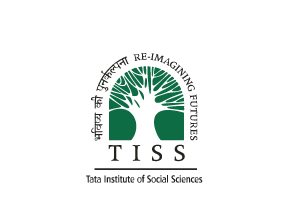AFFILIATIONS
 The Tata Institute of Social Sciences (TISS) was established in 1936, as the Sir Dorabji Tata Graduate School of Social Work. The first school of social work in India, TISS was a pioneering effort with the objective of Social Welfare through academic excellence, a characteristic of the Sir Dorabji Tata Trust (SDTT). Its establishment was the result of the decision of the Trustees of the SDTT to accept Dr. Clifford Manshardt’s vision of a post-graduate school of social work of national stature that would engage in a continuous study of Indian social issues and problems and impart education in social work to meet the emerging need for trained human power. This subsequently influenced the direction of social work education and social research in India. In 1944, the Sir Dorabji Tata Graduate School of Social Work was renamed as the Tata Institute of Social Sciences. The year 1964 was an important landmark in the history of the Institute, when it was declared Deemed to be a University under Section 3 of the University Grants Commission Act (UGC), 1956.
The Tata Institute of Social Sciences (TISS) was established in 1936, as the Sir Dorabji Tata Graduate School of Social Work. The first school of social work in India, TISS was a pioneering effort with the objective of Social Welfare through academic excellence, a characteristic of the Sir Dorabji Tata Trust (SDTT). Its establishment was the result of the decision of the Trustees of the SDTT to accept Dr. Clifford Manshardt’s vision of a post-graduate school of social work of national stature that would engage in a continuous study of Indian social issues and problems and impart education in social work to meet the emerging need for trained human power. This subsequently influenced the direction of social work education and social research in India. In 1944, the Sir Dorabji Tata Graduate School of Social Work was renamed as the Tata Institute of Social Sciences. The year 1964 was an important landmark in the history of the Institute, when it was declared Deemed to be a University under Section 3 of the University Grants Commission Act (UGC), 1956.
Since then, TISS has been expanding continuously in terms of educational programmes and infrastructure. While responding to the changing needs of the social and educational system in the country, the Institute has gone far beyond the initial concern of social work education. Thus, what started as a small institution offering a post-graduate diploma in Social Work, grew into Deemed to be a University and as a result, diversified its activities. Since its inception in 1936, the Tata Institute of Social Sciences has never limited itself to the mandate of a conventional university; rather, it has worked for the promotion of sustainable, equitable and participatory development, social welfare and social justice through: Value-based professional education for social work and other human service professions; Social research and dissemination of socially relevant knowledge; Social intervention through training and field action projects; Contribution to social and welfare policy and programme formulation at state, national and international levels; and Professional response to national calamities, through relief, rehabilitation and disaster management. Over the years, the Institute has, among other thrusts, made a significant contribution to policy, planning, action strategies and human resource development, in several areas, ranging from sustainable rural and urban development to education, health, communal harmony, human rights and industrial relations. In all cases, the focus has been on the disadvantaged and marginalised sections of society, such as organised and unorganised labour, women, children, Dalits, and tribals
Today, the TISS is a Government of India Institution and has earned recognition as an Institution of Repute from different Ministries of the Government of India, various State Governments, international agencies such as the United Nations, and the non-government sector, both national and international. This is due to the academic freedom leading to a positive work ethos and creativity in the Institute, strong linkages among education, research, field action and dissemination and the social commitment and responsiveness to varying social needs.
 Founded in 2012, MESC is not for profit organization promoted by Federation of Indian Chambers of Commerce & Industry (FICCI) and National Skill Development Corporation (NSDC). MESC functions as a skilling arm under the aegis of Ministry of Skill Development and Entrepreneurship (MSDE) for implementing Standards, Training, Accreditation and Reward (PMKVY) scheme of Government of India. In addition, the Media & Entertainment Sector Skill Council aims to serve as a single source of information on M & E sector with specific reference to Skill and Human Resource Development in India. MESC has a mandate to create 11.74 lakhs (1.2 mn approx.) skilled workforce by 2022 and contribute to the National Skill Mission of creating 500 million skilled workforce by 2022. The key objective of MESC Council is to create a robust and vibrant eco-system for quality vocational education and skill development in Media & Entertainment Space in the country.
Founded in 2012, MESC is not for profit organization promoted by Federation of Indian Chambers of Commerce & Industry (FICCI) and National Skill Development Corporation (NSDC). MESC functions as a skilling arm under the aegis of Ministry of Skill Development and Entrepreneurship (MSDE) for implementing Standards, Training, Accreditation and Reward (PMKVY) scheme of Government of India. In addition, the Media & Entertainment Sector Skill Council aims to serve as a single source of information on M & E sector with specific reference to Skill and Human Resource Development in India. MESC has a mandate to create 11.74 lakhs (1.2 mn approx.) skilled workforce by 2022 and contribute to the National Skill Mission of creating 500 million skilled workforce by 2022. The key objective of MESC Council is to create a robust and vibrant eco-system for quality vocational education and skill development in Media & Entertainment Space in the country.
MESC is proud to have strong Industry network and most eminent forums as our Consortium Partners such as FICCI, Film & Television Producers Guild, Indian Outdoor Advertiser’s Association(IOAA), India Broadcasting Foundation(IBF), Film Federation of India(FFI), Association of Radio Operators of India(AROI), who have been constantly involved in supporting and strengthening the Media and Entertainment ecosystem. MESC has been graced to have the most eminent industry professionals on its Governing Council Members such as Secretary General, FICCI, Mr. Ashish S.K ( Chairman- AVGC, FICCI)Ms. Leena Jaisani ( Director, FICCI), Mr Bobby Bedi (M.D Kaleidoscope Entertainment), Mr. Mukesh Bhatt( CEO- Vishesh Films), Mr. Aman Nanda ( Sr. VP Times Media), Monica Nayyar Patnayak (Managing Direcor Sambad Group), Mr. Munjal Shroff ( Co-Founder Graphiti), Wiz Sabbas Joseph( Director- Wizcraft Ent. International Pvt. Ltd.)
 Authorized WorldSkills India Training Centers (AWSITC) Authorised WorldSkill India Training centers are designed to train and groom the future WorldSkill Competition winners. AWSITC will prepare candidates to win the gold by showcasing their skills at national and international stage. AWSITC will engage the Industry to support/participate in training by facilitating Experts/ Infrastructure and Live Projects. AWSITC ensures the candidate is set to hit the stage with global standards and as per the evolving demand from the Industry. AWSITC will work as a think tank and provide inputs on improvising the programs and curriculum for World Skills Competition.
Authorized WorldSkills India Training Centers (AWSITC) Authorised WorldSkill India Training centers are designed to train and groom the future WorldSkill Competition winners. AWSITC will prepare candidates to win the gold by showcasing their skills at national and international stage. AWSITC will engage the Industry to support/participate in training by facilitating Experts/ Infrastructure and Live Projects. AWSITC ensures the candidate is set to hit the stage with global standards and as per the evolving demand from the Industry. AWSITC will work as a think tank and provide inputs on improvising the programs and curriculum for World Skills Competition.
